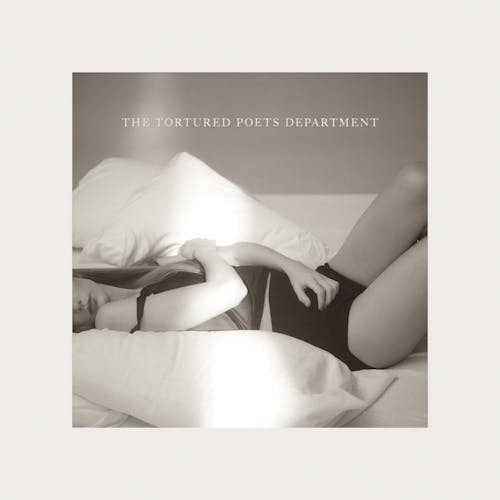Justin Bieber's new album 'Justice' is sonically strong but incredibly tone-deaf

Exactly 11 years-to-date after releasing his debut studio album, “My World 2.0,” Justin Bieber released his sixth studio album, “Justice,” last Friday, and it's ... a little all over the place.
While the production and his voice come together beautifully, and the actual sound is better than what we have received from Bieber in the last few years, the lyrics and overall message missed the mark.
In an attempt to pose himself as a humanitarian, as he has been vocal about supporting the Black Lives Matter (BLM) movement frequently on his Instagram, he named the album “Justice” and tweeted his support for various racial justice organizations in light of the album’s release.
This may seem great, but the album itself almost exclusively talks about how much he loves his wife, model Hailey Bieber, and the peace he was able to find after a decade of struggling with teenage fame.
The opening track titled “2 Much” begins with the voice of Martin Luther King Jr., who said, “Injustice anywhere is a threat to justice everywhere.” This line is a powerful introduction that sets high hopes for an album filled with much-needed social commentary, but it quickly falls short, as the track, although beautiful, transitions into a love song and has nothing to do with racial injustice.
Halfway through the album is a track titled “MLK Interlude,” which is an almost 2-minute long excerpt from King’s sermon, “But If Not.”
“One day some great opportunity stands before you/And calls upon you to stand up for some great principle/Some great issue, some great cause/And you refuse to do it because you are afraid,” King said. “You died when you refused to stand up for right/You died when you refused to stand up for truth/You died when you refused to stand up for justice.”
The interlude is followed by a track titled “Die For You,” which features Dominic Fike, and is a tone-deaf response to the sermon. Bieber sings about how he would die for his wife due to how much he loves her, which is so not the point of what King was preaching.
Although it seems Bieber’s heart is in the right place, as he is using his platform to bring attention to and support the BLM movement, his execution was flawed. Though he received backlash for using King’s voice on an album of love songs, the daughter of the late activist, Bernice King, tweeted her support for Bieber’s humanitarian efforts.
“Each of us, including artists and entertainers, can do something,” she said. “Thank you, (Bieber), for your support in honor of #Justice, of @TheKingCenter’s work and of our #BeLove campaign, which is a part of our global movement for justice. #MLK #EndRacism.”
Aside from the attempted social commentary on racial injustice, the album itself is rather good, and the features are even better. Khalid, Daniel Caesar, Giveon, benny blanco, Burna Boy, BEAM, The Kid LAROI and Chance the Rapper join forces with Bieber for the melodic ballads on “Justice.”
The album was preceded by multiple singles including “Holy” with Chance the Rapper, “Anyone,” “Hold On” and “Lonely” with benny blanco.
Bieber, who was awarded his second Grammy Award earlier this week for Best Country Duo/Group Performance for his feature on Dan + Shay’s “10,000 Hours,” premiered his song “Peaches” on NPR’s Tiny Desk two days before the album’s release, and it was an instant hit.
“Peaches,” which features Daniel Caesar and Giveon, blew up on social media in anticipation of “Justice.” The summertime jam is lyrically glorious with an irresistible melody. The trio released a music video for their song at midnight Friday to be paired with the album, which is a groovy sentiment to the '80s with retro visuals of neon lights and fruity colors.
The collaboration between The Kid LAROI and Bieber on “Unstable” is an unexpected emo-pop track that builds sound variety on “Justice.” The duo details personal insecurities and battles with mental health while expressing their gratefulness for their partners standing by them during their difficulties.
The album concludes with the previously released single, “Lonely,” which is a heartbreaking testament to the downsides of growing up in the spotlight. “Maybe that’s the price you pay/For the money and fame at an early age/And everybody saw me sick/And it felt like no one gave a shit,” Bieber said in the song. “What if you had it all/But nobody to call?”
Songwriter Finneas spoke on the meaning behind this track in an interview with Spin Magazine, discussing the loneliness of being the heartthrob, pop sensation who is Bieber.
“We just sat down and started writing, and I was like, ‘To be honest with you, I just think being ... Bieber must be the loneliest thing. No one else has gone through what he’s gone through from such an early age,' and we started writing a song about what I imagined it might be like to be (Bieber). He’s a brave dude, and he decided he was down to sing it,” Finneas said.
Overall, “Justice” is a professionally crafted pop album with expertly navigated vocals. But unfortunately, it missed the mark on synthesizing its intended and executed contexts. Nonetheless, it's definitely a memorable album.



